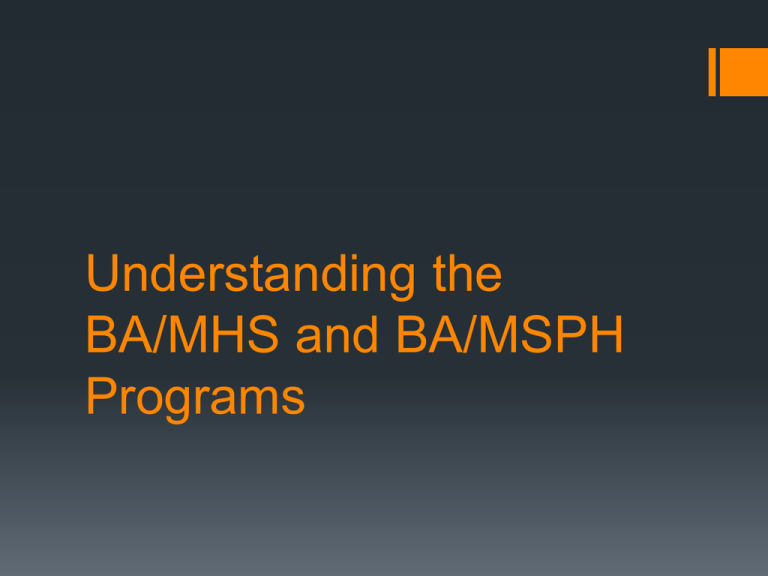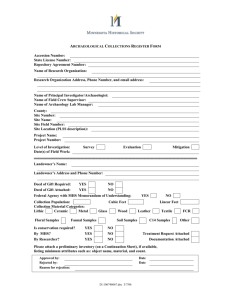The BA/MHS - Krieger School of Arts & Sciences
advertisement

Understanding the BA/MHS and BA/MSPH Programs What is it? The Bachelor of Arts/Masters of Health Sciences and Bachelor of Arts/Masters of Sciences in Public Health programs are a coordinated academic collaboration between the Krieger School of Arts and Sciences and the Johns Hopkins Bloomberg School of Public Health (JHSPH). The following JHSPH Academic Departments participate: • • • • Environmental Health Sciences Epidemiology Health Policy and Management Mental Health IMPORTANT: What is it not? It is NOT a degree program, but a pathway of transition from the BA to a Master’s Degree in Public Health What is the difference between an MHS and an MSPH? An MHS is an academic degree. An MSPH is a professional degree. How does it work? A current PHS major applies for admission to the department of their interest during the summer between their junior and senior years. Please refer to the handout for each department’s details and deadline. In doing so, you express your desire to matriculate in this department after receiving your Bachelor’s Degree. In return, the application fee and GRE requirements are waived for you. AND you benefit from receiving JHSPH guidance as you begin your JHSPH coursework in senior year. Half of the JHSPH credits taken during the senior year, up to a total of 16, can be applied toward the Master’s degree credit requirement. JHSPH courses taken during the senior year can be used to fulfill course requirements in the Master’s degree. At a glance – please refer to your handout for more detail: Department Degree Duration Deadline Environmental Health Sciences MHS ScM MSPH 1 year 2 years 1½ - 2 years July 1, 2015 Epidemiology MHS 1-2 years June 1, 2015 Health Policy and Management MSPH 2 years July 1, 2015 Mental Health MHS 4 terms July 1, 2015 A bit more on each department… ENVIRONMENTAL HEALTH SCIENCES Dr. Bill Spannhake Mission The Department of Environmental Health Sciences integrates diverse scientific disciplines in its quest to discover, translate and disseminate new knowledge critical to understanding the impact of environmental factors on individuals and human populations—a goal that is central to public health. Paramount to our mission is a commitment to the education and training of public health professionals to solve environmental health challenges ranging in scale from molecular to global. Environmental Health Sciences Master’s Degree Programs Master of Health Science (MHS) • 1 year, Academic Program • Coursework and Essay-based • 3 Specialty Tracks: • Human Toxicology and Pathophysiology • Population Environmental Health • Sustainability and Global Environmental Health Master of Science (ScM) • • • • Master of Public Health (MSPH) 1 year, Academic Program Coursework and Research-based Same tracks as MHS Students enroll in the MHS, then transfer to ScM • 16 - 24 months, Professional Program • Coursework & Internship-based • 2 Tracks: • Occupational & Environmental Hygiene • Toxicity Testing & Human Risk Assessment EPIDEMIOLOGY Dr. Terri Beaty Mission The mission of the Department of Epidemiology is to improve the public’s health by training epidemiologists and by advancing knowledge concerning the causes and prevention of disease and the promotion of health. As the oldest autonomous academic department of epidemiology in the world, the Department of Epidemiology at the Johns Hopkins Bloomberg School of Public Health has maintained leadership in fulfilling this mission. Epidemiology: an observational science Epidemiology is the study of how diseases are distributed in populations: Distribution partly reflects the causes or “etiology” of disease Understanding etiology creates opportunities for controlling/preventing disease Ultimate goals of epidemiology are: to identify causal agents or risk factors to develop effective control/prevention strategies Applications include: Identifying & confirming risk factors for disease Evaluating intervention strategies Building a scientific foundation for public policy Epidemiology is largely an observation science. Clinical trials represents an experimental arm, however Research Tracks Cancer Epidemiology Clinical Cardiovascular Disease Epidemiology Clinical Trials & Evidence Synthesis Methods Epidemiology of Aging Environmental Epidemiology General Epidemiology and Methodology Genetic Epidemiology Infectious Disease Epidemiology And some sample projects underway: HIV/AIDS: large cohort studies of at-risk groups Cardiovascular disease: cohort & case-control studies of CVD & kidney disease Cancer: Community based cohorts & hospital based studies of prostate, breast, colon & other cancers Genetic Epi: Studies of autism, birth defects, asthma, kidney disease, eye diseases etc. Clinical trials & systematic reviews of numerous diseases HEALTH POLICY AND MANAGEMENT Christine King Mission The Department of Health Policy and Management seeks to improve health, and prevent disease and disability through the education of future public health leaders, and through research on the causes and possible remedies of significant public health problems facing our nation and other industrialized countries. The Department seeks to improve our capacity to identify: Policy options that promote and protect the health status of populations Strategies that improve access to health and preventive services, particularly among the most vulnerable Methods that enhance the effectiveness and efficiency of health care for medical and mental illnesses Models for improving the financing, organization and delivery of preventive and curative health services Application Requirements The following courses MUST be completed before you apply for the BA/MSPH: The Environment & Your Health Fundamentals of HPM Biostatistics (minimum ‘B’ grade) Fundamentals of Epidemiology (minimum ‘B’ grade) Calculus (AP or transfer credit) Cumulative GPA = 3.0+ PHS Major GPA = 3.5+ No ‘C’s in the major MENTAL HEALTH Dr. Jeanine Parisi Mission The mission of the Department of Mental Health is to advance the understanding of mental and behavioral disorders, to develop, implement, and evaluate methods to prevent and control these disorders, and to promote mental health in the population. Data Collection Methods • Population-based surveys • to understand the causes and consequences of mental health in order to improve health in the general population • Intervention trials • to prevent disorders in individuals who are currently healthy • to minimize future consequences for those with a current disorder or a history of the disorder Department of Mental Health • The first and the only department-level unit in a school of public health • Faculty • 22 Full-time faculty • 48 Part-time faculty • 31 Jointly appointed • Mental Health Seminar Series • Wednesday 12:15-1:30 pm; Hampton House Research Areas Psychiatric Epidemiology International Mental Health Research Areas School and Communitybased Interventions Youth Violence Prevention Programs Research Areas Drug and Alcohol Dependence Epidemiology Cognitive Health and Aging Research Areas Quantitative Methods in Mental Health Research Psychiatric and Behavioral Genetics Degree Programs • BA/MHS • Open to JHU Public Health Studies students • Apply end of Junior year; JHSPH courses in Senior year (up to 16 credits) • Transition into MHS program upon graduation • Master in Health Science (MHS) • 9-month academic program • Coursework and final research paper • Can be combined with a certificate program Degree Programs • Doctor of Philosophy (PhD) • Research-oriented (not clinically-based) degree • Coursework, Comprehensive Exam, Preliminary Exams, Thesis • Students typically complete program in 4-5 years • Doctor of Public Health (DrPH) • Practice-based degree; designed for the student who has a MPH or equivalent degree • Students typically complete program in 4-5 years Courses • First Term • 330.617: The public health approach to psychopathology • Second Term • 330.641: Prevention and control of alcohol and drug abuse • 330.667: Mental health and the law Courses • Third Term • 330.661: Social, Psychological and Developmental Processes of Mental and Behavioral Disorders • 330.612: Introduction to Behavioral and Psychiatric Genetics • Fourth Term • 330.607: Prevention and Control of Mental Disorders: Public Health Interventions Thanks! FAQs • Is the MHS degree associated with the BA/MHS different from a regular MHS degree from the School of Public Health? • Can I apply to more than one department’s BA/MHS? • I am not certain that I want to pursue the MHS – am I locked in if I become a part of the BA/MHS? • Is it possible to apply during the regular cycle as a senior? • By what date must I decide to accept an offer of admission to the BA/MHS program? • Application includes: • Online JHSPH form with narrative • Transcript with grades thru Junior year Fall & Spring courses • Three letters of recommendation General Questions? Enjoy speaking with the representative of each department!





